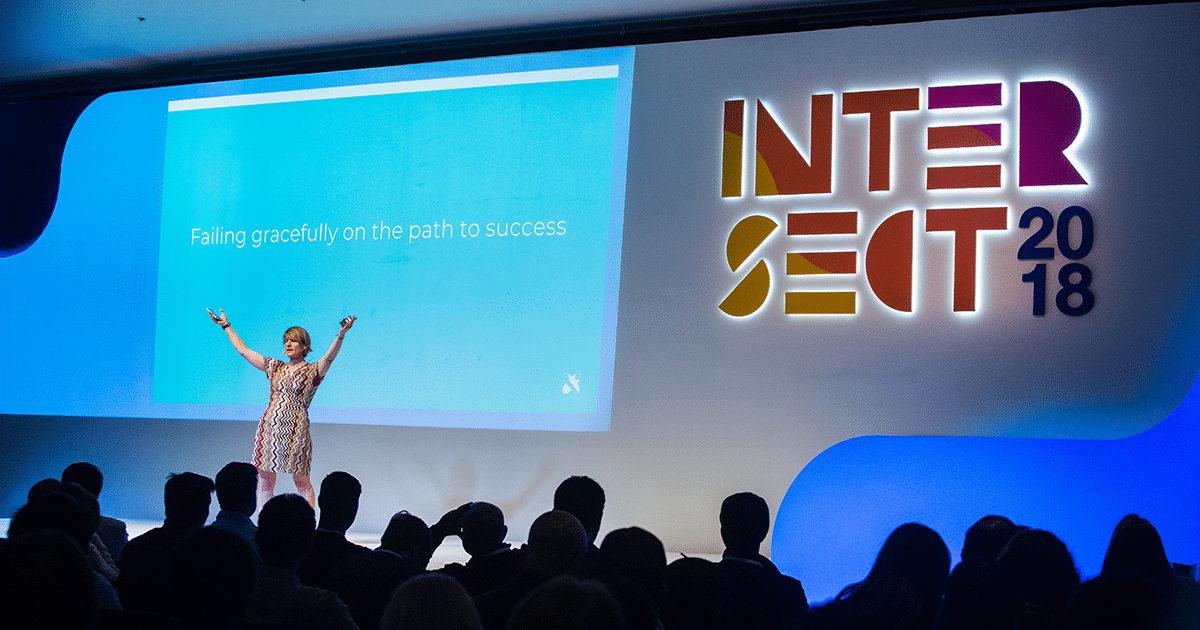
X’s Obi Felten, on stage at Intersect 2018
Obi Felten’s rather remarkable job title is “Head Of Getting Moonshots Ready For Contact With The Real World, X, The Moonshot Factory.” In March of this year, she delivered a keynote address at our annual Intersect event. The title of her talk was “Daring Greatly: How to Fail Gracefully on the Way to Success.” In her speech, she addressed what she described as “one of those Silicon Valley cliches.” She was talking about the idea of failing fast. What she had to say about it was wonderful:
“We don’t want to fail fast, but we do want to learn very fast.”
In a world where emerging innovators all over the world are seeking new paths to success on the strengths of their unique backgrounds, novel ideas, and deeply-felt passions, this is a critical distinction. What is important is not that we fail, but that we learn. When people are committing to making their dreams come true, and they’re finding inspiration in the entrepreneurial spirit of Silicon Valley, it’s vital that we be clear about failure’s relationship to success.
The improbable rise of the ‘fail fast’ ethos
Fast failure’s path to Silicon Valley omnipresence is a curious one. Mark O’Connell, writing in Slate magazine back in 2014, offered a sharp take on the matter. In an article titled The Stunning Success of “Fail Better” (delightfully subtitled: “How Samuel Beckett became Silicon Valley’s life coach”), O’Connel writes:
“Fail Better, with its TEDishly counterintuitive feel, is the literary takeaway par excellence; it’s usefully suggestive, too, of the corporate propaganda of productivity, with its appeals to “think different” or “work smarter” or “just do it.” And the fact is that these six telegraphic bursts of exhortation actually work pretty well as a personal motto, once that sanding and smoothing has been completed.”
The original Beckett quote is of course: “Ever tried. Ever failed. No matter. Try again. Fail again. Fail better.”
From failing fast to failing better
As Felten pointed out, this idea of failing fast has indeed become a bit of a Silicon Valley cliche. But it’s arguably an unfortunate one, as it’s easy to misinterpret. In “How We Work,” author Leah Weiss offers a thoughtful and nuanced interpretation of what “failing better” can and should mean:
“From a Buddhist perspective, ‘failing better’ means acknowledging human imperfection and accepting that failure is part of the learning process—if we give people room to learn. Failing better means trying and trying again, but with a difference. Reflection makes the difference, and not just in Silicon Valley.”
Weiss’ point about “reflection” offers an intriguing parallel to Obi Felton’s insights. One of many powerful statements Felten made was this one: “Fear of failure is the biggest impediment to innovation.”
If we combine what Weiss and Felten are saying, we can see that failure in and of itself has no inherent value. It is only when when we reflect upon failure, and transform it into a learning opportunity, that we can move forward. Most importantly, by understanding and experiencing failure as learning, we can transcend our fear of it.
Daring greatly
This is why it’s critical we puncture the myth of fast failure—because aggressively pursuing failure is not the same as genuinely overcoming our fear of failure, and it’s the latter that we should pursue, because it is fear that holds us back. The title of Obi Felten’s speech was taken from a 1910 speech by Theodore Roosevelt that has come to be known as “The Man in the Arena”:
“It is not the critic who counts; not the man who points out how the strong man stumbles, or where the doer of deeds could have done them better. The credit belongs to the man who is actually in the arena, whose face is marred by dust and sweat and blood; who strives valiantly; who errs, who comes short again and again, because there is no effort without error and shortcoming; but who does actually strive to do the deeds; who knows great enthusiasms, the great devotions; who spends himself in a worthy cause; who at the best knows in the end the triumph of high achievement, and who at the worst, if he fails, at least fails while daring greatly, so that his place shall never be with those cold and timid souls who neither know victory nor defeat.”
Is it you?
If you are reading this, and if you have an idea that you believe in, these words can make for a wonderful call to action. And if you doubt yourself, you might turn for inspiration to a more recent story of failing better, daring greatly, and learning fast. In a playfully-titled article from CNN (She was too short to play Goofy. Then she invented Spanx. Now she’s a billionaire), Sara Blakely details her journey from selling fax machines door-to-door, to being named by Forbes as the youngest self-made female billionaire in 2012. Here is Blakely, on self-doubt:
“You just imagine everyone else is so much smarter, and more qualified than you are. Then, one day you wake up and you go, ‘What if it is me? Why not?'”
Is it you? No time like the present to find out!

